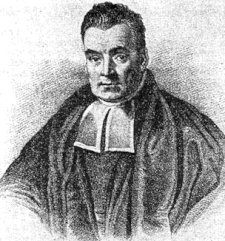Thomas Bayes
| Thomas Bayes | |
|---|---|

Portrait used of Bayes in a 1936 book, but it is doubtful whether the portrait is actually of him. No earlier portrait or claimed portrait survives.
|
|
| Born | c. 1701 London, England |
| Died | 7 April 1761 (aged 59) Tunbridge Wells, Kent, England |
| Residence | Tunbridge Wells, Kent, England |
| Nationality | English |
| Known for | Bayes' theorem |
| Signature | |
Thomas Bayes (/ˈbeɪz/; c. 1701 – 7 April 1761) was an English statistician, philosopher and Presbyterian minister who is known for having formulated a specific case of the theorem that bears his name: Bayes' theorem. Bayes never published what would eventually become his most famous accomplishment; his notes were edited and published after his death by Richard Price.
Thomas Bayes was the son of London Presbyterian minister Joshua Bayes, and was possibly born in Hertfordshire. He came from a prominent nonconformist family from Sheffield. In 1719, he enrolled at the University of Edinburgh to study logic and theology. On his return around 1722, he assisted his father at the latter's chapel in London before moving to Tunbridge Wells, Kent, around 1734. There he was minister of the Mount Sion chapel, until 1752.
He is known to have published two works in his lifetime, one theological and one mathematical:
It is speculated that Bayes was elected as a Fellow of the Royal Society in 1742 on the strength of the Introduction to the Doctrine of Fluxions, as he is not known to have published any other mathematical works during his lifetime.
In his later years he took a deep interest in probability. Professor Stephen Stigler, historian of statistical science, thinks that Bayes became interested in the subject while reviewing a work written in 1755 by Thomas Simpson, but George Alfred Barnard thinks he learned mathematics and probability from a book by Abraham de Moivre. Others speculate he was motivated to rebut David Hume's anti-Christian An Enquiry Concerning Human Understanding. His work and findings on probability theory were passed in manuscript form to his friend Richard Price after his death.
...
Wikipedia
